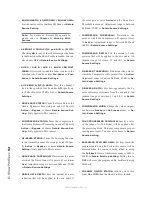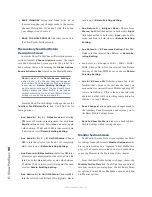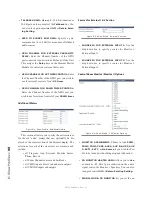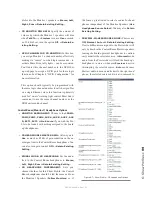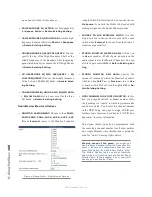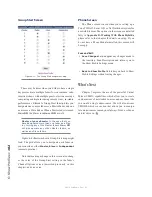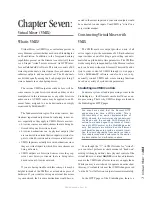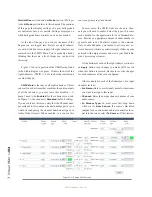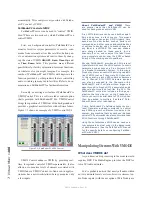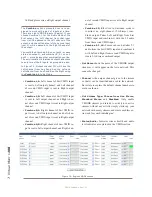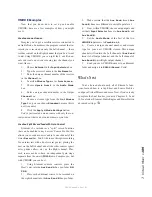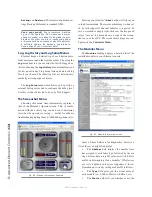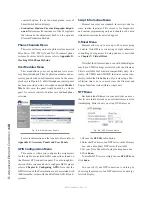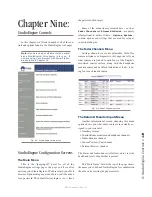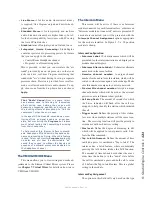
7:
Vi
rtu
al
Mi
xe
r •
10
6
©2016 Axia Audio- Rev 1.8.1
momentarily. This example is only possible with Pathfin-
derPC control of VMIX.
PathfinderPC Control of VMIX
PathfinderPC server can be used to “control” VMIX.
How? There are two modes by which PathfinderPC can
control VMIX.
First, as a background controller, PathfinderPC can
monitor Livewire system parameters or receive com-
mands from external devices like satellites, button pan-
els, or automation systems and react to them by chang-
ing the state of VMIX
ON/OFF
,
Gain
,
Time Up
, and/
or
Time Down
fields. This provides many different
possibilities for facility automation, Intercom functions,
or whatever else you might imagine. For example, the
combo of PathfinderPC and VMIX could duplicate the
function provided by other products that are controlling
audio switching in many radio facilities. Refer to docu-
mentation on PathfinderPC for further information.
Secondly, an exciting new feature of PathfinderPC is
VMIX Control. This is a software fader control option
that is provided with PathfinderPC Pro. VMIX Control
brings the operation of VMIX out of the background and
provides a graphical user interface with software faders.
Figure 7-2 shows an example of a VMIX control GUI.
Figure 7-2: PathfinderPC VMIX Control
VMIX Control enhances VMIX by providing real-
time, foreground control of VMIXer parameters. It also
allows us to monitor levels of streams associated with
VMIX faders. VMIX Control is often used in applica-
tions such as a news workstation where you require only
a few inputs.
About PathfinderPC and VMIX: There
are several ways that PathfinderPC can be
used for background control VMIX.
First, VMIX functions can be used both as quali-
fiers and actions in stack events. This means
that a designer can select GPIO triggers, time
based events, user button pushes, serial port
commands, and other options and combinations
of options to decide when to make changes to
any fader in a VMIXER. The user can make a
gain change based on these events, turn a
channel off or on, and or adjust the fade times,
giving complete control over the VMIXer based
on any of the stacking events qualifiers.
Second, PathfinderPC provides an ACU protocol
translator which uses the VMIX system to mimic
hardware devices such as a Sine Systems ACU
to a Prophet Automation System. In this way, a
Prophet system can control the mixing capabili-
ties of VMIX just as if they were ACU channels.
In this scenario, each VMIX submixer becomes
one 5 Channel ACU. GPIO hardware devices
can also be mapped to the Channels within
PathfinderPC and it will allow those triggers to
pass through to Prophet if the associated audio
channels are turned on just like the ACU. The
PathfinderPC suite also includes a Bridge ap-
plication that may be run on the Prophet sys-
tem to convert the serial data to TCP, which can
then be passed to multiple “clustered” Path-
finderPC servers for redundancy.
Finally, PathfinderPC’s Software Authority pro-
tocol translator includes commands to control
any VMIXer present on Element consoles in the
system; any machine that can send user defined
serial or TCP commands can also control and read
VMIX functions through PathfinderPC.
Using these techniques VMIX can be used as a
fully automated virtual mixer in the background
of each Element. (See the PathfinderPC manual
for the specific details on configuring Pathfind-
erPC with VMIX.)
Manipulating Streams With VMODE
What does VMODE do?
As you know, audio processing in the modern world
requires DSP. The StudioEngine provides the DSP for
Axia IP-Audio networks.
You’ve probably noticed that nearly all audio within
an Axia network travels as stereo Livewire streams. Au-
dio Node inputs (with the exception of Mic Nodes) are



